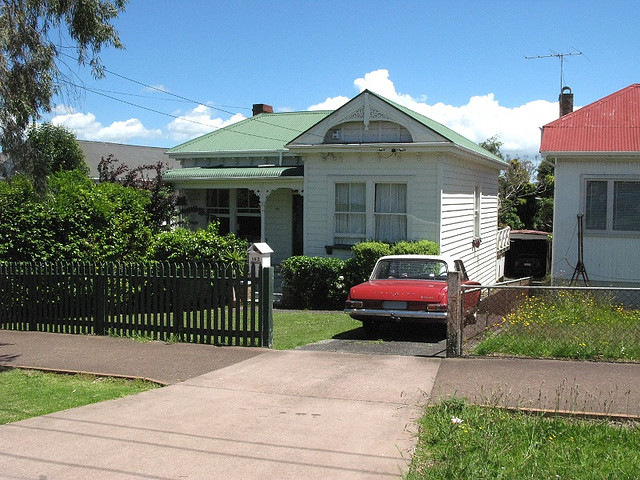In recent weeks accountants and property investors were trading blows over the tax treatment of housing. As well, a survey was published which revealed most New Zealanders now believe owning your own home is out of reach for most. One of the major causes of that situation is the very thing accountants and property investors were squabbling about.
The tax issues around housing are very simple. Owning a house is just one way people store their savings. Bank deposits, company shares and managed funds are other places people stash wealth, and at a fundamental level these options are no different to housing.
All these wealth stores produce a stream of benefits every year – often in the form of cash but not always. Term deposits produce interest which is a cash benefit, business ownership provides profits and company shares provide dividends which are cash benefits too. Managed funds typically earn both interest and dividends on behalf of investors.
Tax officials love annual cash flows like interest, profit and dividends. That’s because regular cash flows can be easily measured and traced, and therefore taxed. Not surprisingly, we have evolved very detailed systems for taxing cash returns like interest, profit and dividends. And wages too for that matter. It’s a pity our diligence and exactitude at taxing cash benefits hasn’t been paralleled in our understanding that non-cash benefits are just as real and therefore should equally be taxed.
While all stores of wealth produce benefits to their owners, not all produce immediate cash benefits. Some, like land and listed shares go up and down in value and the owner gets the accumulated net benefit in one cash hit when they sell up – the accumulated net gains are called ‘capital gains’. Many countries tax these capital gains but New Zealand limits itself to taxing capital gains earned by traders (those who declare they bought the asset with the intention to sell) only. The effectiveness of capital gains taxes is questionable.
Wealth is also stored in the houses atop land. Houses offer benefits in their own right – the value of the shelter they provide. These buildings might provide owners with cash in the form of rent or it might provide them with benefits ‘in kind’. The value of the shelter provided to owner occupiers is none the less for it being delivered ‘in kind’ – its value is equal to the rent the owner would otherwise have received.
When housing produces a cash benefit in the form of rent it gets taxed just like interest, company profits and dividends. And that’s fair enough as far as it goes. But the deferred cash benefits due to rising property values are left untaxed. And when houses are owner-occupied none of the benefit (of not having to pay rent) is taxed. So our tax system currently pings the owners of immediate cash-yielding wealth but not the owners of other types of wealth.
The consequences of leaving significant stores of wealth out of the tax net are serious. People direct their savings to where the tax load is lightest – land and housing. It’s no accident that New Zealand’s businesses struggle to get equity investors while people queue to buy houses. Our economic growth suffers accordingly, yet this is a problem we’ve created entirely ourselves – and it’s fixable.
Despite what the detractors say, it is relatively easy to tax all wealth effectively, regardless of whether it produces an immediate cash return, a deferred cash return and/or non-cash benefits. We can impute an annual return to all wealth based on a reasonable benchmark and tax that (giving recognition for any tax paid on actual annual cash returns). The average rate of return from government bonds is a conservative benchmark that would do the job. If stores of wealth like land and housing aren’t producing benefits at least equal to this ‘risk-free rate’ they wouldn’t be held by anyone, so taxing them at this rate is a reasonable approximation of the minimum benefits the owners might be getting. We proposed this type of tax reform in our book The Big Kahuna.
For owner-occupied housing you would only tax the equity people have in their homes, not the mortgage value as well. This is because the mortgage produces interest which is taxable to the investors who ultimately provided the funds for the mortgage.
There will of course be cash-flow consequences for the owners of land and housing that doesn’t produce immediate cash returns – the annual tax based on imputed benefits will have to be funded out of wages or interest or some other cash source. So what? That’s how council rates are currently paid, and it hasn’t caused a national catastrophe. For many people the annual tax owing wouldn’t be high, because they own relatively little of their home. However those with significant equity in housing would be facing a fair tax burden for the first time and will need to think hard about where they invest. Heaven forbid, they might actually balance their investments, putting their savings into businesses or lending to others, instead of expanding their homes to levels which far exceed their (or anyone else’s) reasonable shelter requirements. Similarly, any farmers investing for capital gains rather than taxable profits would need to rethink their strategy. Most importantly it would stop the price of housing becoming so prohibitive for so many New Zealanders.
By sticking their head in the sand over taxing of housing, our tax officials and politicians are ruining New Zealand’s economic base, and into the bargain pushing the cost of a house way beyond more and more people. All because nobody has the guts to face up the issue because of the precious votes they think they’ll sacrifice.


